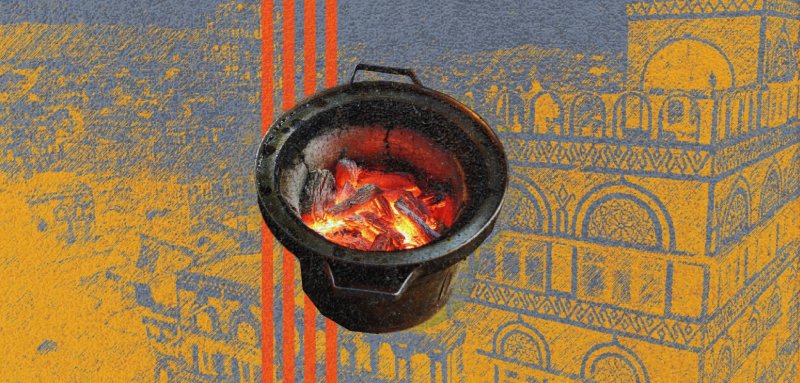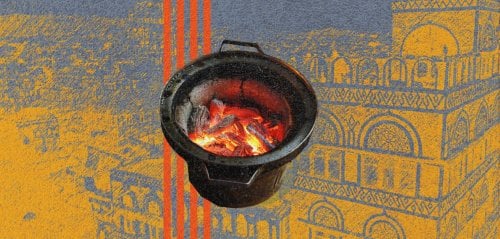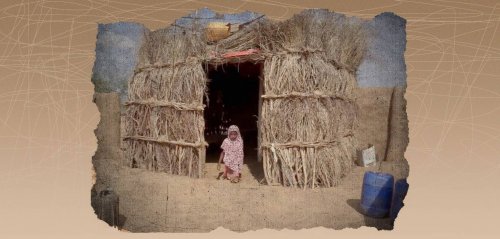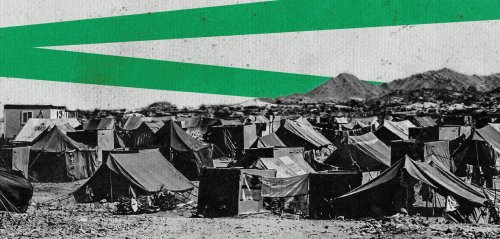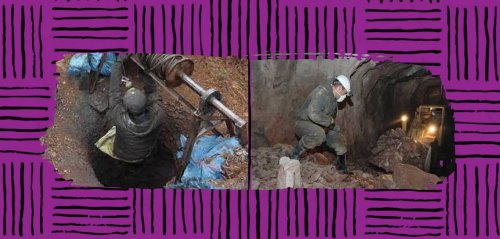Winter comes as a time packed with cold and disease, and hinders the movement of Yemenis in the streets at night and in the early morning hours when the weather carries waves of frost, in light of the lack of winter readiness in a country where most of the population lives below the extreme poverty line. In this chilly weather, there is hardly a house in Yemen without any "coal".
Fatima Atef is a grandmother to eleven grandchildren. She lives in the al-Rawda area in the capital Sana’a, and is one of the women whose harsh living conditions forced her to buy charcoal. She tells Raseef22, “Sana'a has changed. Its summers are scorching and its winters have become something akin to a morgue freezer for the dead. It saddens me that my grandchildren are getting sick while there is charcoal for cooking and smoking, so I wondered: Why not use it for heating in the winter?”
Fatima doesn't realize the danger of coal, saying, "We used to light wood in stone stoves every day, and we were in good health. Today, coal turns into embers as soon as it burns, and the air increases the speed of its ignition."
“It saddens me that my grandchildren are getting sick while there is coal for cooking and smoking, so I wondered: Why not use it for heating in the winter?”
Despite the presence of charcoal for cooking in Yemeni homes, using it for heating is still an experience marred by fear of fire and smoke suffocation. Naima Abdo recalls her tragedy in a village in the Haraz area of Sana’a Governorate, “Thirty years ago, I was sleeping with my two daughters at night, and the weather was cold, with rain and fog that lasted for days, so I took the coal embers of fire from the ‘dahwa’ (stove or corner of cooking with wood and charcoal), and brought it into my room. We were about to die of suffocation, and I only woke up when the door was broken late in the morning.”
Despite the availability of modern means of heating and cooling, the material cost of electrical appliances in terms of purchase and consumption, the fear of an electrical short circuit, the warnings of heat emissions of an electric heater, and the crowding of homes with family members to reduce the cost of rent in light of the lack of income in times of war and unemployment, have all made the idea of buying an electric heater a dangerous luxury, leaving few alternatives, with people sometimes using the smoke of wood and coal in crowded, narrow, and unventilated rooms.
Today, we see that the imminent danger and cases of pulmonary allergies from the use of charcoal inside homes are increasing, and we often hear headlines on the news like: "The mother only wanted to keep her children warm, but it killed them". Last winter, a mother, her baby, and his cousin died, while her husband was transferred to intensive care, after they were exposed to the smoke of a stove containing a large amount of incense and charcoal that they had used to heat a very small room in the Bayt Baws neighborhood of Sana’a.
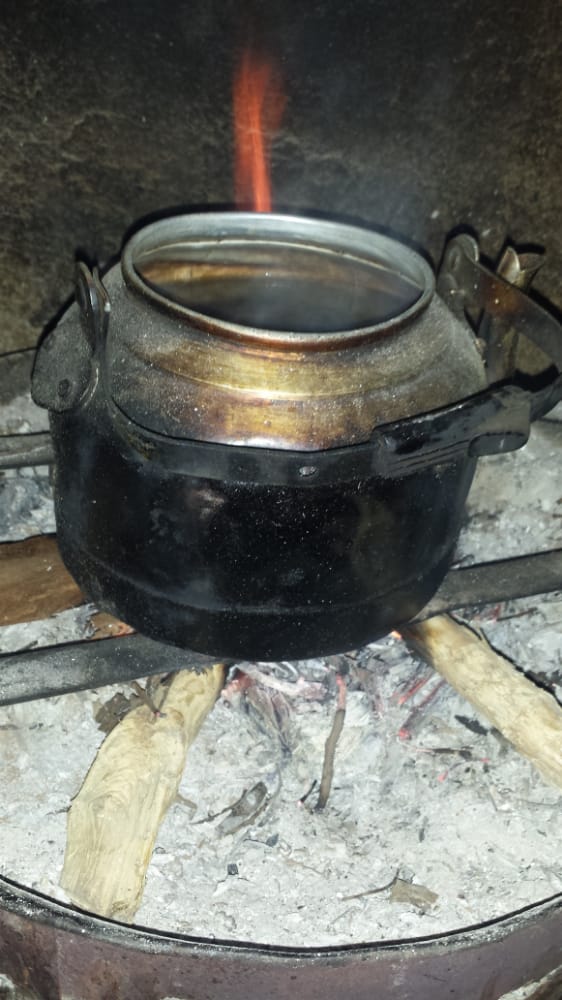
Using charcoal for cooking in Yemen
Climate and the need for coal
In a country with mild heat in the summer, the Yemeni winter takes place between September and April, amidst a culture of fear of the cold despite the presence of heat from the sun all year round. This is because there is a prevalent belief that disease - any disease - comes from an open window next to a person, along with the fact that Yemenis are more inclined to warm weather.
The climate in Yemen is diverse, due to its geographical location overlooking two seas, and the difference in its terrain from mountains and plains, to coasts and deserts. It is closer to being cold at night and moderate during the day, far from the effects of global warming.
Not feeling the danger of carbon monoxide rising in the house is due to the fact that it's an odorless gas and is accompanied by the gradual leaking of carbon into the blood, replacing oxygen and leading to a person feeling sleepy, before entering a coma
Every year, meteorologists warn of cold waves and frostbite, with people getting sick because they do not wear winter clothes, and malnutrition leads to weakened immunity and thus increases the chances of contracting serious diseases. United Nations estimates indicate that more than half of Yemen's population is at risk of acute hunger, and half of children under the age of five — more than two million children — are at risk of acute and severe malnutrition as a result of political conflicts, war, and its aftermath since 2011.
The absence of ventilation culture
People resort to a number of heating methods in the winter. In hopes of keeping warm in the evening, they buy a quantity of coal to burn it, leaving the embers of fire to continue to burn while the people of the house sleep, with the danger of this extending from a fire to death by suffocation with carbon monoxide and dioxide gas.
What makes things even worse is the absence of the culture of ventilation, as it is not important to many people in the winter who are indifferent to the fumes and gasses rising from burning coals and the tandoor (clay oven that bread is made in). Many also resort to manually cleaning with straw brooms, which leads to cases of lung irritation, stroke, and cardiac arrest, all of which are frighteningly on the rise even among children.
Headaches, nausea, difficulty breathing, and dizziness indicate a lack of oxygen in the blood, and today we see that cases of suffocation and complications from inhaling carbon monoxide, the "silent killer", take place much more than can be counted or published in the media, prompting the government to send SMS awareness messages in November, calling for "caution when using heating tools as they cause suffocation".
Today we see that cases of suffocation and complications from inhaling carbon monoxide, the "silent killer", take place much more than can be counted or published in the media
Dr. Hamdi Abdel Wali, a specialist in respiratory systems and lung sensitivity, attributes that a person not feeling the danger of carbon monoxide rising inside the house to the fact that it is a gas without smell, and is accompanied by the gradual and slow leaking of carbon into the blood, replacing oxygen and leading to a feeling of relaxation and drowsiness in a person, before he enters into a coma that leads to cardiac arrest, brain damage, or lung cancer. Children are at a much greater risk than adults as they breathe at a faster rate.
Coal and living conditions
Coal in Yemen also plays a major role in the fight against hunger, after the gas crisis reached its peak in the country. Yemenis in the last five years have collected tree branches, cartons, and paper from the roads and asked for the embers of firewood from bakeries, prompting housewives to buy coal to prolong the consumption time of a gas cylinder, and bury it in ashes to make it last a long time.
Abdelaziz Muftah, a coal vendor in the Bab al-Yemen market in Old Sana'a, says, "Before the war, Yemenis dispensed with the use of firewood in cities with the availability of domestic gas. Then, a gas cylinder was sold for 750 riyals, which is equivalent to less than a dollar and a half, but now it is sold on the black market for twenty-five dollars, and is distributed only by turn because it is not available.”
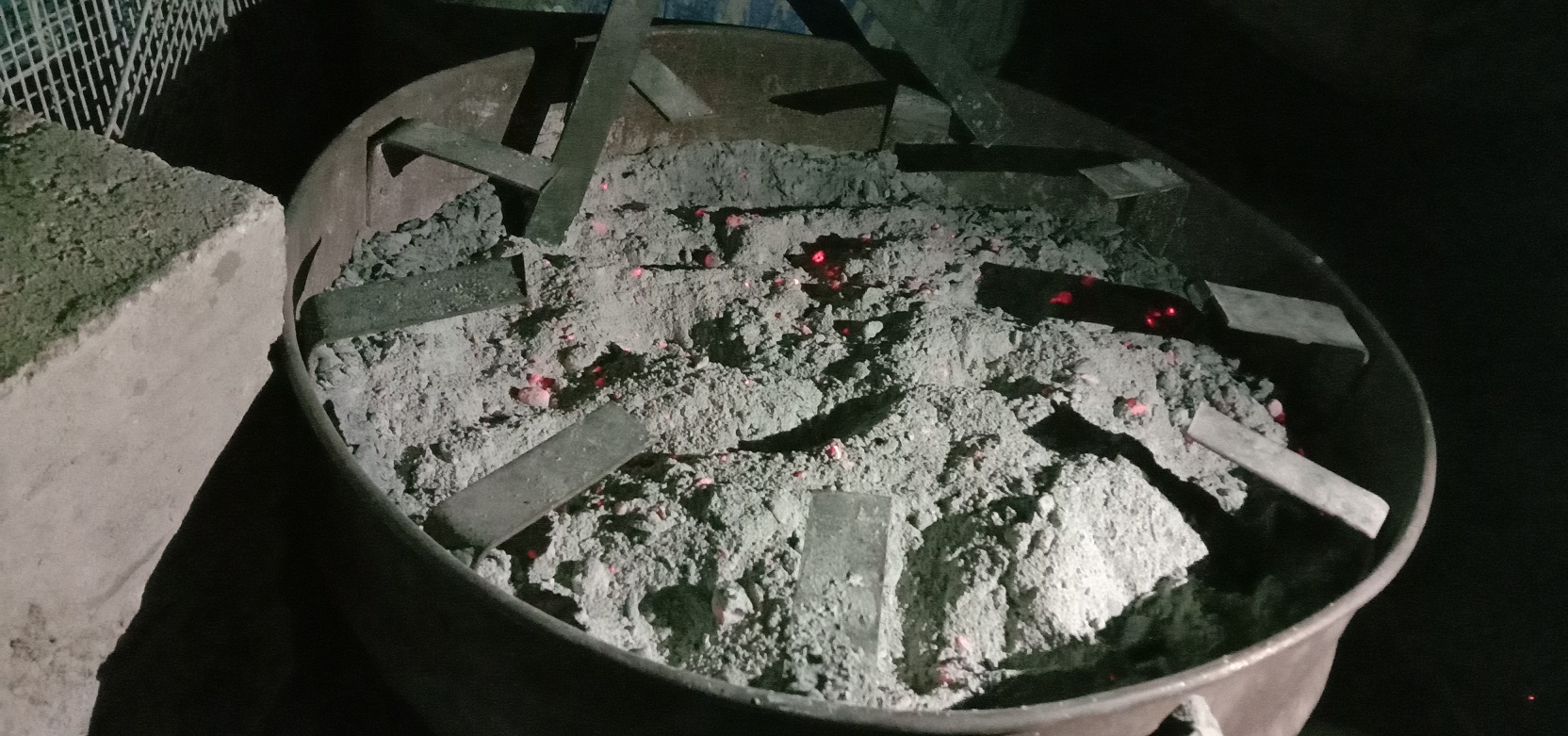
Using charcoal and embers for cooking in Yemen
But because coal is related to the traditional Yemeni practice of smoking with khat, and Yemenis preferring to bake in the tandoor using firewood, the firewood market has remained in a state of commercial activity. Today, after the domestic gas crisis, high prices, along with cheating practices when it comes to its refilling, not adding odor gas, and neglecting the maintenance of the cylinder, charcoal has become a widely-used alternative, according to the seller, a bag of coal weighing 25 kilograms costs ten thousand riyals ($18).
The danger of charcoal extends to the environment, as rampant overlogging of trees depletes the vegetation, which means a decrease in oxygen levels and an increase in greenhouse gasses resulting from combustion and pollution, which cause climate change and global warming.
Charcoal is produced from burning tree wood at high temperatures, making the water lose its oxygen and hydrogen components. So when black charcoal ignites, it emits toxic carbon monoxide gas in high concentrations.
People resort to a number of heating methods in the winter. In hopes of keeping warm, they burn coal, leaving the embers of fire to continue to burn while the people of the house sleep, leading to a high possibility of fire or death by suffocation
Safe heating
There are alternative methods for heating that grandmothers have been using for many years. Some of these traditional tricks include: laying out blankets and clothes under the sun and then keeping them folded until night falls, sewing a sleeping bag made out of cloth and fabric, covering the blanket with a bed sheet, placing heavy curtains for the windows while leaving the room door ajar to freshen the air, covering the chest and neck area, massaging hands and feet with natural oils to maintain strong blood circulation. Raising the body's immunity, exercising, and wearing heavy clothes is the basis for facing the winter cold and frost.
Dr. Abdel Wali warns against taking cough medicines and anti-allergy medicine without a prescription, and recommends a healthy exposure to the sun early in the morning to get vitamin D. He also advises drinking plenty of hot drinks, taking vitamin C and calcium, and opening windows to let the sun and oxygen in.
In order not to have to face the flu with other serious, chronic, and fatal diseases, one must not resort to using charcoal except under extreme necessity and in the tiniest amounts, and only after exhausting all means and tricks of healthy cooking and safe heating, while taking security and safety precautions like igniting the coal outside the house in a small amount until the emitted smoke disperses, and opening outlets for ventilation, as the ultimate goal here is to create warmth and cook food, not create toxic gasses within a small room.
Raseef22 is a not for profit entity. Our focus is on quality journalism. Every contribution to the NasRaseef membership goes directly towards journalism production. We stand independent, not accepting corporate sponsorships, sponsored content or political funding.
Support our mission to keep Raseef22 available to all readers by clicking here!
Interested in writing with us? Check our pitch process here!
